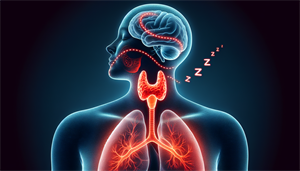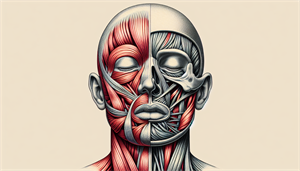Snoring can be a minor annoyance, but what if it’s more than just an occasional nuisance?
When it’s persistent and occurs with your mouth closed, it may point towards underlying health issues like sleep apnea.
Understanding how to tackle this issue, such as learning “how to stop snoring when mouth is closed,” can significantly enhance the quality of your shut-eye and overall well-being.
Key Takeaways
-
Closed-mouth snoring can be caused by nasal congestion, tongue position, or relaxation of throat muscles, often addressed with exercises or non-invasive techniques to improve airway patency.
-
Non-invasive remedies for closed-mouth snoring include adjustments in sleep position, breathing exercises, and maintaining an ideal room humidity, alongside lifestyle changes like weight management and avoiding alcohol and sedatives.
-
Anti-snoring devices such as nasal dilators, chin straps, and Mandibular Advancement Devices, alongside lifestyle adjustments, can provide individualized solutions to closed-mouth snoring; persistent cases may require medical consultation.
Understanding Closed-Mouth Snoring

Closed-mouth snoring is a phenomenon where individuals snore despite their mouth being closed, or in other words, having their “mouth closed.” It suggests that the root of the problem lies within the nasal or throat airway rather than the mouth. This form of snoring may occur due to obstructions in the airway, such as blocked nasal passages, enlarged tonsils, or weak palatal tissue.
One method of reducing snoring involves practices that target the mouth and throat. These exercises have been designed to strengthen and tone the muscles in the mouth, throat, and other parts of the upper airway, potentially reducing snoring and moderate obstructive sleep apnea.
Throat based snoring can also be mitigated with myofunctional therapy that focuses on strengthening the muscles in the oral, facial, and throat regions.
Nasal Congestion
Nasal congestion plays a significant role in closed-mouth snoring. It obstructs the airway, leading to difficulty in nasal breathing and, consequently, snoring. Various factors can lead to nasal congestion, including:
-
Minor illnesses like the cold, flu, and sinus infections
-
Allergies and hay fever
-
Nasal polyps
-
Deviated septum
-
Enlarged adenoids or tonsils
Identifying and addressing the underlying cause of nasal congestion can help reduce snoring and improve sleep quality.
For individuals with sleep apnea, structural issues like a deviated septum, which can cause nasal congestion, are significant contributors to snoring. Moreover, allergies can induce nasal congestion, leading to closed-mouth snoring. Therefore, addressing nasal congestion is a crucial step in improving breathing and promoting a good night’s sleep.
Tongue Position
The position of the tongue while sleeping is another key element contributing to closed-mouth snoring. Incorrect positioning of the tongue can obstruct the airway, leading to snoring. Tongue-based snoring occurs when the tongue relaxes and obstructs airflow into the lungs, resulting in breathing difficulties.
Certain tongue positions, such as placing the tongue upwards against the roof of the mouth or moving it backward along the roof, can assist in strengthening tongue muscles, enhancing tongue position, and thereby decreasing closed-mouth snoring.
Individuals who experience snoring caused by the position of the tongue may find benefit from mouth taping as it can help prevent the tongue from falling back into the throat.
Throat Muscle Relaxation
Relaxation of the throat muscles also plays a role in the occurrence of closed-mouth snoring. When the throat muscles relax excessively, they can constrict the airway and generate vibrations while breathing, resulting in snoring. During sleep, all muscles in the body, including those that assist in keeping the throat open, naturally relax. However, excessive relaxation of these muscles can result in obstructive sleep apnea, hindering proper breathing. Some common causes of excessive relaxation of throat muscles include:
-
Alcohol consumption
-
Sedative medications
-
Obesity
-
Sleep position (sleeping on your back can cause the tongue and throat muscles to relax more)
-
Aging
If you suspect that excessive relaxation of your throat muscles is causing your snoring, it is important to consult with a healthcare professional for a proper diagnosis and treatment options.
Mouth exercises can help mitigate this issue. Repetitive oropharyngeal exercises serve to tone the airway and tongue muscles, promoting nasal breathing, and thus aiding in the reduction of snoring and milder cases of obstructive sleep apnea. Performing these exercises for at least 10 minutes per day for a duration of three months can lead to a noticeable reduction in snoring or sleep apnea.
Non-Invasive Techniques to Stop Snoring with a Closed Mouth
In addition to understanding the causes of closed-mouth snoring, it is just as important to investigate non-invasive techniques for its alleviation. These techniques include adjusting sleep positions, practicing breathing exercises, and using humidifiers to maintain optimal air quality.
Simple to incorporate into daily routine, these methods can have a profound effect on the reduction of snoring. They help prevent airway obstructions and enhance the strength of muscles in the upper airway, ultimately reducing closed-mouth snoring. Some methods to try include:
-
Sleeping on your side instead of your back
-
Elevating the head of your bed
-
Avoiding alcohol and sedatives before bed
-
Losing weight if necessary
-
Practicing good sleep hygiene
Utilizing humidifiers can also assist in alleviating closed-mouth snoring by reducing nasal congestion.
Sleep Position Adjustments
The position in which you sleep can have a major impact on your snoring habits. Sleeping in a supine position causes the soft tissues in the throat to unwind, obstructing the airway and resulting in snoring. Changing sleep positions, such as sleeping on your side, can mitigate closed-mouth snoring by averting this form of airway blockage.
Sleeping on your side enhances upper airway patency and prevents the base of the tongue and soft palate from collapsing to the back wall of the throat. To consistently maintain a side-sleeping position throughout the night, it’s recommended to:
-
Place a pillow between the knees for proper spine alignment
-
Use a firm and thick pillow for adequate head and neck support
-
Align the chin and neck with the center of the shoulders
Breathing Exercises
In your quest to reduce closed-mouth snoring, breathing exercises can make a significant difference. These exercises strengthen the airway muscles and improve nasal breathing, which can significantly reduce snoring.
Certain mouth and throat exercises, like:
-
holding the mouth open and contracting the muscles at the back of the throat for throat exercises
-
deep breathing exercises
-
pursed lip breathing
-
diaphragmatic breathing
-
mouth breathing
are particularly effective. Regular practice of these exercises can enhance lung efficiency, strengthen the diaphragm, increase inspiratory muscle strength, and expand lung capacity.
Regular breathing exercises, such as alternate nostril breathing and belly breathing, can encourage breathing, enhance lung efficiency, and strengthen the muscles involved in breathing, leading to improved nasal breathing.
Humidifiers
Despite being simple, humidifiers are an effective weapon against closed-mouth snoring. By increasing the moisture in the air, they alleviate:
-
irritation in the nasal passages
-
reduce inflammation
-
thin mucus
-
ultimately decreasing nasal congestion and snoring.
Warm-mist humidifiers, such as the LEVOIT Cool and Warm Mist Humidifier, are highly recommended for individuals aiming to alleviate closed-mouth snoring. The recommended humidity level to set on a humidifier for reducing snoring is between 40-50%. However, it’s worth noting that overuse of a humidifier may lead to some adverse effects, including exacerbation of respiratory symptoms, skin and hair dryness, and irritation of the oral or nasal passages.
Anti-Snoring Devices for Closed-Mouth Snorers

For a more targeted approach to tackle closed-mouth snoring, there are several anti-snoring devices on the market. These include nasal dilators, chin straps, and Mandibular Advancement Devices (MADs), all designed to enhance airflow and diminish snoring.
These devices work by addressing the physical causes of snoring. Here are some examples:
-
Nasal dilators widen the nasal passages, improving airflow
-
Chin straps assist in maintaining proper jaw alignment, preventing airway obstructions
-
Mandibular Advancement Devices (MADs) reposition the jaw and tongue, causing them to move forward and reducing throat obstruction, thus maintaining an open airway during sleep.
Nasal Dilators
Nasal dilators are simple devices designed to widen nasal passages, enhancing airflow and reducing closed-mouth snoring. These include nasal strips that are applied externally to widen the nostrils and improve airflow.
These devices work by mechanically expanding the nasal passages, reducing nasal congestion and enabling improved breathing, ultimately leading to a reduction in snoring. They can be applied externally or internally to facilitate enhanced airflow through the nose. However, it’s noteworthy that nasal dilators are generally not recommended for individuals diagnosed with obstructive sleep apnea (OSA).
Chin Straps
Chin straps are another effective tool for combating closed-mouth snoring. They assist in maintaining proper jaw alignment and preventing airway obstruction, thereby reducing snoring. Brands like the Brison Anti-Snoring Chin Strap and Vosaro’s adjustable anti-snore chin strap come highly recommended.
When choosing a chin strap, consider factors such as:
-
Material
-
Fit
-
Comfort
-
Compatibility with other sleep equipment like CPAP machines
The strap should be worn snugly but without causing discomfort. It should be positioned under the chin, wrapped around the head, and secured with adjustable Velcro straps at the back to prevent snoring.
Mandibular Advancement Devices (MADs)
Mandibular Advancement Devices (MADs) are an effective solution for closed-mouth snoring. They work by:
-
Repositioning the jaw and tongue
-
Causing them to move forward
-
Reducing throat obstruction
-
Maintaining an open airway during sleep.
There are various types of MADs available, including Bite MAD, Custom MAD, and Semi-Custom MAD. However, potential drawbacks such as jaw discomfort, soreness, excessive salivation or dry mouth, and tooth or gum discomfort should be taken into account when considering MADs. Additionally, MADs may require adjustment or replacement over time.
Lifestyle Changes to Address Closed-Mouth Snoring

Changes in lifestyle can also significantly contribute to the management of closed-mouth snoring. These changes include weight management, regular exercise, and avoiding alcohol and sedatives before bedtime.
Maintaining a healthy weight can help decrease the pressure on the airway and improve muscle tone, thereby reducing snoring. Regular physical activity can strengthen airway muscles and enhance overall health, reducing snoring. Additionally, avoiding alcohol and sedatives before bedtime can help prevent throat muscle relaxation, a common contributor to snoring.
Weight Management
Maintaining a healthy weight can go a long way in reducing closed-mouth snoring. It helps by decreasing the pressure on the airway and improving muscle tone. Additionally, using continuous positive airway pressure (CPAP) devices can further alleviate snoring issues.
Obesity can lead to excessive neck fat, which can compress the upper airway and exacerbate snoring. Moreover, the distribution of fat in the body, particularly in the neck area, can directly compress the upper airway and exacerbate snoring. Losing weight can alleviate sleep apnea symptoms and reduce the pressure on the airways, potentially decreasing or eliminating snoring.
Exercise and Physical Activity
Regular exercise and physical activity can contribute significantly to reducing closed-mouth snoring. These activities can tone the muscles in the throat, making them less likely to slacken and obstruct the airway, a common cause of snoring.
Specific exercises, like holding the mouth open and contracting the muscles at the back of the throat, are particularly effective in strengthening airway muscles. Moreover, enhanced general health from regular physical activity can lead to better sleep quality, resulting in decreased snoring.
Avoiding Alcohol and Sedatives
Avoiding certain substances before bedtime can also help reduce closed-mouth snoring. Alcohol and sedatives can cause the throat muscles to relax excessively, leading to airway obstruction and snoring. Ensuring a good night’s sleep is important for overall health, and avoiding these substances can be beneficial.
Alcohol consumption, particularly close to bedtime, exacerbates snoring by inducing relaxation in the muscles of the mouth and throat. Similarly, sedatives cause muscle relaxation, which negatively affects muscle tone and airway dynamics, leading to an increase in snoring. Therefore, it’s recommended to avoid alcohol four to five hours before sleep and sedatives at least two hours before bedtime.
When to Consult a Medical Professional
Despite the potential benefits of trying various remedies, there are times when medical advice should be sought. If you experience signs of sleep apnea, such as:
-
gasping for air during sleep
-
loud, chronic snoring
-
excessive daytime sleepiness
-
morning headaches
-
difficulty concentrating
Or if your snoring persists despite trying various remedies, it’s time to consult a healthcare provider.
A physician can provide a proper diagnosis and guide you towards effective treatment. If they suspect that your snoring is linked to sleep apnea, they might recommend a referral to a specialist for additional evaluation or prescribe a home sleep test to gauge your risk of apnea.
Signs of Sleep Apnea
Sleep apnea is a serious condition characterized by excessive relaxation of the muscles in the back of the throat, leading to airway blockage, disrupted sleep, and decreased oxygen levels. Common indicators of sleep apnea include loud snoring and excessive daytime sleepiness. If you notice these signs, it’s important to seek medical advice.
Sleep apnea can be diagnosed at home using a home sleep apnea test, but this should be followed up with a medical diagnosis. It’s also noteworthy that sleep apnea manifests differently in men and women due to hormonal differences and other factors.
Persistent Snoring
In the condition of persistent closed-mouth snoring, an individual snores incessantly, irrespective of whether the mouth is closed. It is linked to numerous health risks such as:
-
cardiovascular disease
-
hypertension
-
stroke
-
heart attack
-
reduced work productivity
-
daytime drowsiness
-
an elevated risk for high blood pressure
Apart from the physical health risks, persistent snoring can also have psychological impacts. It can lead to an increased risk of depression, anxiety, and sleep disturbances, resulting in poor sleep quality, sleep deprivation, and mood disturbances over time. If you suffer from persistent closed-mouth snoring, it’s crucial to consult a medical professional.
Summary
In conclusion, closed-mouth snoring is a common but potentially serious issue that can disrupt your sleep and overall well-being. Understanding its causes, such as nasal congestion, tongue position, and throat muscle relaxation, is the first step towards addressing it. Non-invasive techniques, anti-snoring devices, and lifestyle changes like weight management, regular exercise, and avoiding alcohol and sedatives can help reduce snoring. Remember, if you experience persistent snoring or signs of sleep apnea, it’s crucial to seek medical advice. With the right information and strategies, you can overcome this issue and reclaim peaceful nights of restful sleep.
Frequently Asked Questions
Why do I snore if my mouth is closed?
When your mouth is closed, snoring can still occur due to poor muscle tone in the throat or tongue, leading to a blocked airway and resulting in louder snoring. Blocked nasal passages, enlarged tonsils, or weak palatal tissue may also contribute to closed-mouth snoring.
What is the trick to stop snoring?
The trick to stop snoring is to sleep on your side, avoid alcohol before bedtime, and ensure you get enough sleep. Making these simple changes can make a huge difference in reducing snoring.
How do you open nasal passages to stop snoring?
To open your nasal passages and reduce snoring, consider using nasal strips or nasal tubes to increase airflow. Additionally, a hot shower before bed and rinsing your nose with a saltwater solution can also help open up nasal passages.
Can I tape my mouth shut to stop snoring?
Mouth taping to stop snoring is not recommended as there isn't enough scientific evidence to support its benefits, and it can be dangerous due to potential breathing obstruction (Wikipedia).
Related health topics?
There are various related health topics that are worth exploring for a better understanding of overall well-being.


